
Howdy, rokrbox TV viewers! We hope you’ve had a fantastic start to 2022 and staying true to your own resolutions to succeed in this new year. In the spirit of the “new year, new me” mindset, our rokrbox family has something “new” to share with you!
In today’s special feature, we decided to give Josh Cunningham a break from hosting. Instead, we listen as he shares his own incredible story of success on GRIT: The Real Estate Growth Mindset podcast, hosted by Brian Charlesworth.
To anyone involved or interested in the evolving world of real estate, trust us: you will NOT want to miss these phenomenal insights from our founder & CEO. So buckle up, and get ready for Josh’s take on the ISA role, the Top 5 Mistakes real estate agents make, and where the real estate industry is headed next!
[1:30] Josh starts off by explaining how he got a “jumpstart” into real estate back in 2011. After graduating from Texas A&M with a degree in Entrepreneurial Business Management, Josh’s first post-college job was a recruiting position at a small boutique brokerage.
In July of 2011, Josh bumped into Frank Klesitz, the CEO of Vyral Marketing, at a training event. “We really hit it off,” Josh explains. “Just chatting about business, and entrepreneurship…and, of course, we had a really great time out at the [Vegas] nightclubs,” Josh adds with a smile.
He goes on to say that he and Frank later reconnected on Facebook, which led him to realize the true extent of Frank’s impressive success. Although Frank only had 35 clients at the time, they were all nationally recognized top-producing agents.
[2:30] “There are so many cliches about how to be successful, or how to follow successful people,” Josh points out. “But essentially, if you surround yourself with people who are doing bigger and better things than you are, then you can follow their path, and learn from their mistakes and successes.”
Josh tells Brian that everything changed when he found Frank on Facebook. Josh opened up a conversation by asking Frank how he could work for his Omaha-based company from College Station, Texas—which opened the first door that would ultimately lead Josh to start his own company.
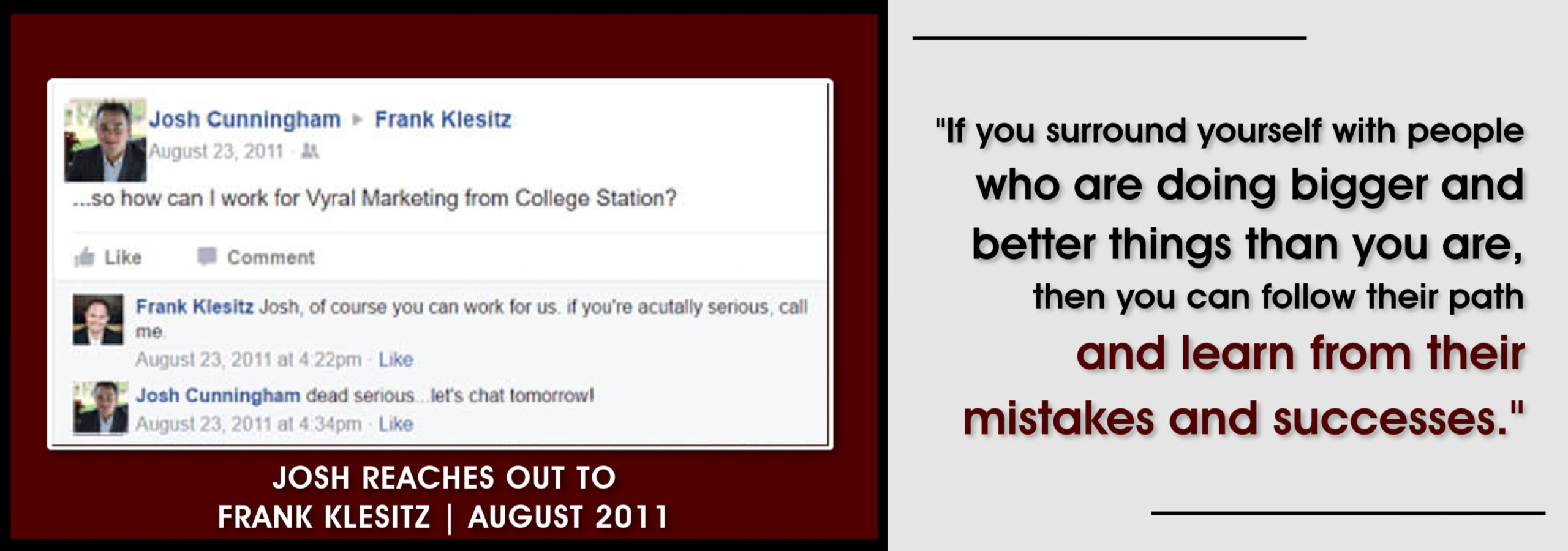
[3:05] “I took a leap of faith, and left my cushion job behind, and jumped into that entrepreneurial world,” Josh remembers. He continues to say that he and Frank were on the road for 2-3 weeks a month, traveling between seminars, masterminds, conferences, and “any sort of prestigious room” they could find a way into.
It was this experience with Frank of Vyral Marketing in his mid- to late twenties that opened Josh’s eyes to an opportunity—one that would ultimately evolve into rokrbox, his own highly successful company.
Spring Bengtzen, one of Josh’s very first clients from Vyral Marketing, played a major part in Josh’s success story, functioning as the catalyst that set everything in motion. After expressing her frustration with conversion rates, working leads in Boomtown, and other ISA-related issues that so many agents face, Josh identified an opportunity to help solve that problem.
[5:30] “That was the initial journey, the initial project that we set out to do,” Josh concludes. “To help [Spring] hire an ISA, in-house.”
That particular issue was easily solved: they hired and trained an excellent ISA, who consistently delivered hot opportunities to Spring and her team. Unfortunately, this led to another problem.
“That’s when she saw the real money being made,” Josh admits. This led the ISA they had hired and trained to pursue her real estate license, and become an agent herself—forcing Josh and Spring to return to square one.
[6:20] “That was when I realized there really needs to be a permanent turnkey solution for the industry,” Josh says. In hopes of solving Spring’s problem, Josh returned to College Station, Texas—home of Texas A&M University, which had the talent pool Josh wanted.
“These students come to this town,” Josh tells Brian, “and they’re looking for ways to invest in themselves, and grow their skills, and explore new experiences….so they walk the stage with multiple job offers. That was the connection I saw to find a good, consistent supply of talent.”
[7:00] In the summer of 2013, Josh returned to his alma mater, put on a headset, and started “smiling and dialing.” Today—after training over 350 young ISAs, handling over 2.5 million internet leads—rokrbox is in full force, and growing every day.
[8:30] Brian shifts gears to address the buzz surrounding the ISA model, noting that more and more real estate professionals are seeking ISA-related solutions to maximize their success. “So if I want, I can just leverage you guys [at rokrbox] to be my ISA team, and you’ll pass leads to my agents?” Brian confirms.
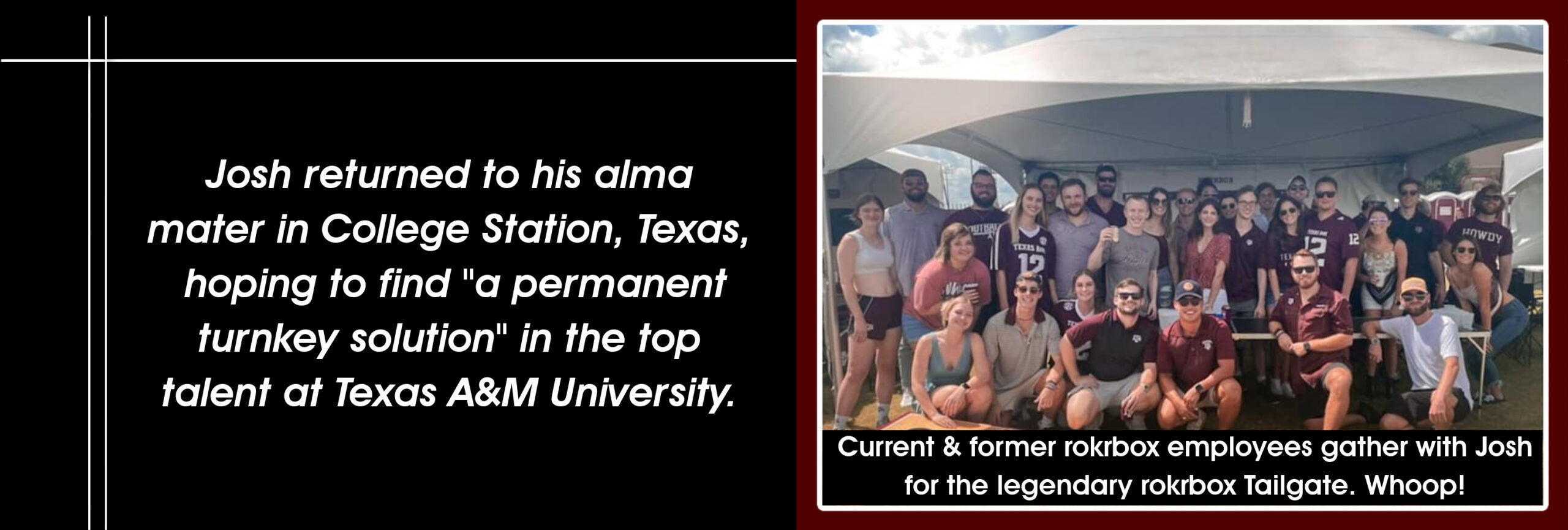
“Exactly,” Josh agrees, adding that his rokrbox ISAs specialize in a couple CRMS: Boomtown and Commissions Inc., although his team is in the process of rolling out another department for a third platform, Chime.
Of course, Josh adds, rokrbox always keeps an ear to the streets, and his team is always open to the opportunity to explore other CRMs.
“That’s what we are,” Josh states. “We’re a human capital organization. We’re not a technology add-on, we’ve never written a line of code in our life…We essentially learn that CRM, call the leads, pass them along to the agents as soon as they get hot and ready. That’s the formula we follow.”
[11:00] Transitioning to the value of effective ISAs, Brian points out that agents just “aren’t lead follow-up people. So, it’s critical that you have somebody who’s going to be there, on top of it.”
[11:30] Nodding, Josh adds that an internal report at rokrbox revealed the 5 biggest mistakes that agents make with leads. “It doesn’t matter where they’re at in the process,” he clarifies, and goes on to break down his findings. Mistake #1? Asking closed-ended questions.
[11:50] Josh points out that, although this might seem like a no-brainer to those who have sales experience, it’s more challenging for people newer to the industry.
“A closed-ended question is anything you can say yes or no to,” he states, whereas an open-ended question is intended to open up a conversation.
[12:30] Using an example, Josh explains how so many agents start a conversation with a brand new lead…and shoot themselves in the foot as soon as they ask, ‘Hey, canI help with your home search?’ The fatal word? Can.
“Someone can say no,” Josh says, “and where do you go from there? It’s an uphill battle. Instead, think about the significant difference by just adding one word: How can I help with your home search?”
“Just that one addition,” Brian agrees, nodding. “One word. That’s an invaluable thing.”
[13:50] Mistake #2, Josh continues, is not listening to understand. For example, so many people just fire off questions—but instead of tuning in to the answer, their brains are already focused on the next question they need to ask.
[15:00] “A lot of times, what’ll happen is you’ll ask one question, and the lead might actually answer another question in their response, and then you—acting like a complete amateur—then turn right around, and ask them the same question that they’ve literally just answered.”
He goes on to emphasize the nature of the leads being called: not referrals, but cold leads.
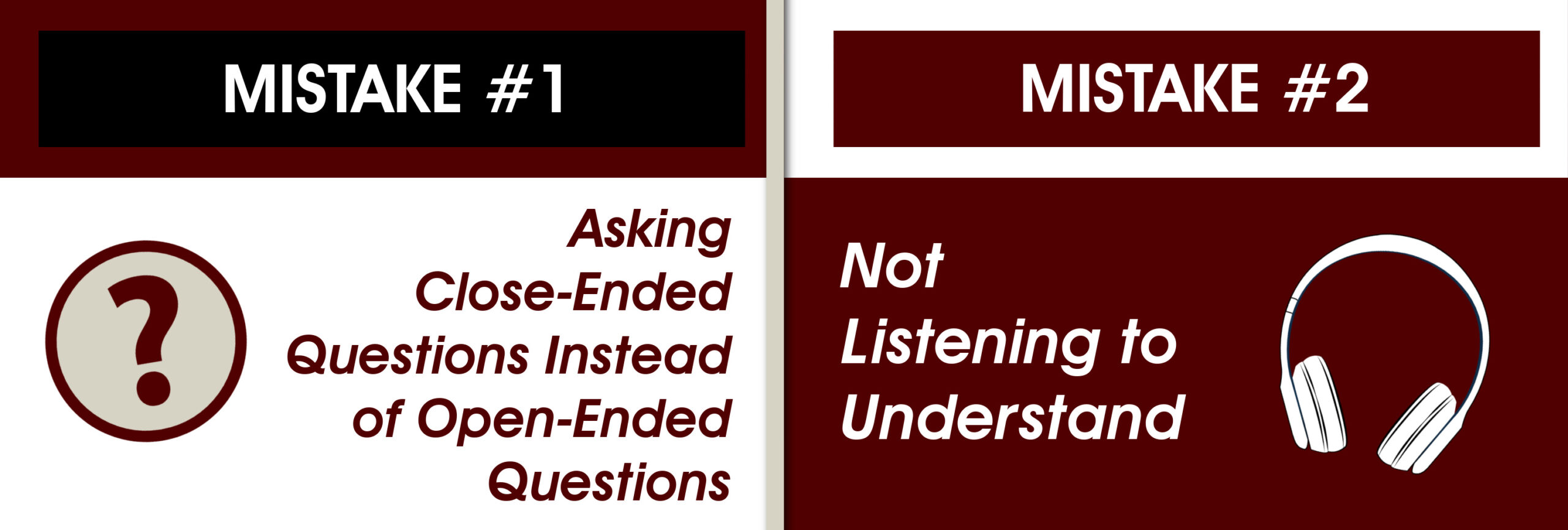
[15:30] “You literally kind of stole their information off the internet,” he continues. “You baited them with a website, gave them some listings. After a couple listings, you literally force them to register. That’s a cold lead.”
Another important distinction is why real estate prospects choose to go online in the first place. “They’re not looking for you, as a realtor,” Josh accentuates. “What they’re looking for is the homes. So you have to interject that search, and provide some value.”
[16:00] Of course, all of this ties back to the conscious effort of listening to understand. “If you jump on the phone and start firing off questions,” Josh says, “then they feel like you’re not listening to them, not understanding them. It creates such a chasm of disconnect, [and] they’re not going to want to move forward with you.”
[17:50] Moving on to Mistake #3, Josh says, “Another thing agents will do that’s just terrifying is they’ll talk about themselves, instead of inquiring about the needs and motivation of the [person] on the other end of the phone.”
Fortunately, that’s a skill that Josh’s hardworking ISAs have honed. “That’s the whole reason we [rokrbox] have been able to grow and scale our operation from coast to coast,” Josh states. “Again, all of our callers are based out of College Station, Texas. They’re students at Texas A&M with zero local market knowledge.”
On the contrary, most agents assume they need to brag about themselves, and establish their expertise in order to earn credibility with potential clients—but the opposite is true with Josh’s Texas-based ISA team.
[18:50] “We have the conversation about them,” Josh stresses. “With anyone in the country, without having local market knowledge. And you make the person feel very special, and important, and wanted, and need in their life. That’s what makes the quality of a good listener.”
The biggest takeaway? “Don’t talk about yourself,” Josh encourages. “Ask really good questions, and find out about the other person’s needs and motivation. Then you can use your expertise to connect them with the best resource available.”
This strategy, in addition to our ability to listen to understand, are also valuable skills that are easily applied to our everyday lives.
[20:00] Brian agrees, adding that the skills Josh is referring to can be applied to other areas of life, too. “It’ll completely change your life,” he points out. “Not just your business, right?”
“Right,” Josh exclaims. “Your business, your personal relationships—with your parents, your children, whatever…You’re going to make better connections.”
[20:35] Moving on to Mistake #4, Josh explains that a lot of agents err by making weak recommendations. He points out that many people relate to wanting to take that “next step forward” in the sales process, but we aren’t sure how to put that into words.
“‘Beating around the bush’ is essentially what it is,” Josh tells Brian, expanding on the concept of mitigated speech—words like maybe, might, possibly, could, or if you’d like. “People don’t want to [work] with an amateur…They want to work with an expert. And the way an expert communicates is [by making] strong recommendations.”
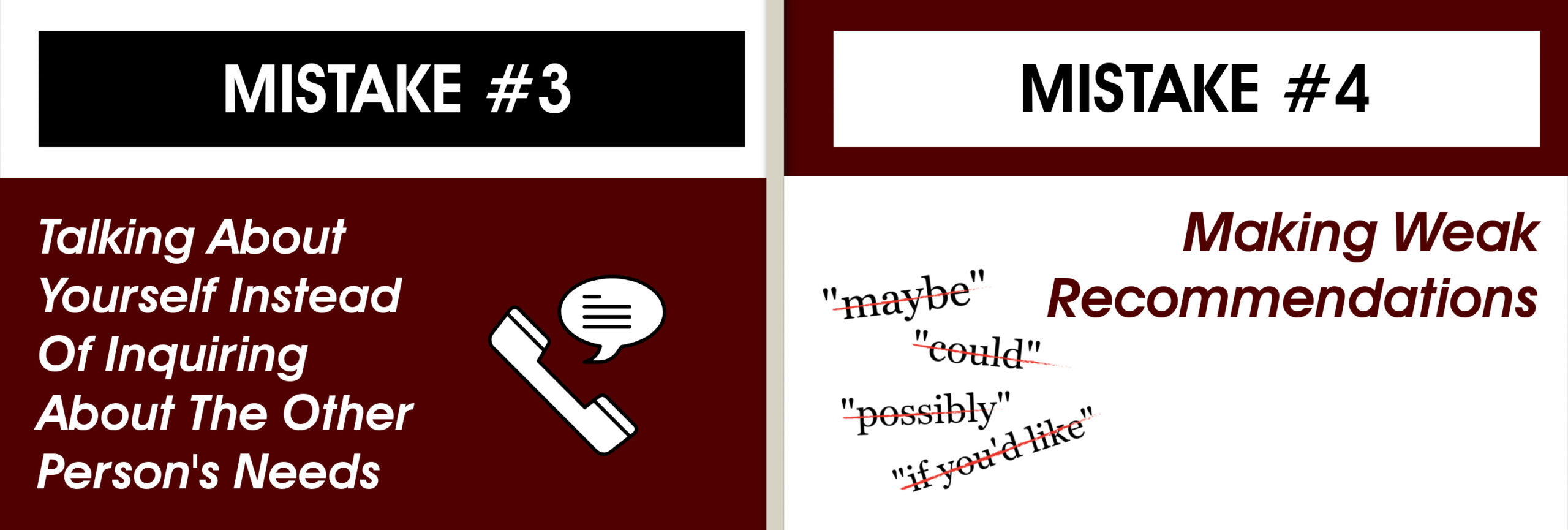
As an example, Josh uses the concept of a doctor telling a patient that they need a life-changing surgery: the physician wouldn’t communicate using mitigated language; they would make the strong recommendation they know is best for that patient’s wellbeing—in a manner that is brief, assertive, and based on that doctor’s credibility and expertise.
[22:30] “So remove all the mitigated speech,” Josh concludes, “quit beating around the bush, and get straight to the point. A very simple, easy phrase you can always use is, ‘Based on what you’ve told me, I would recommend blank.’ It’s a very simple phrase—you can plug and play that in any industry.”
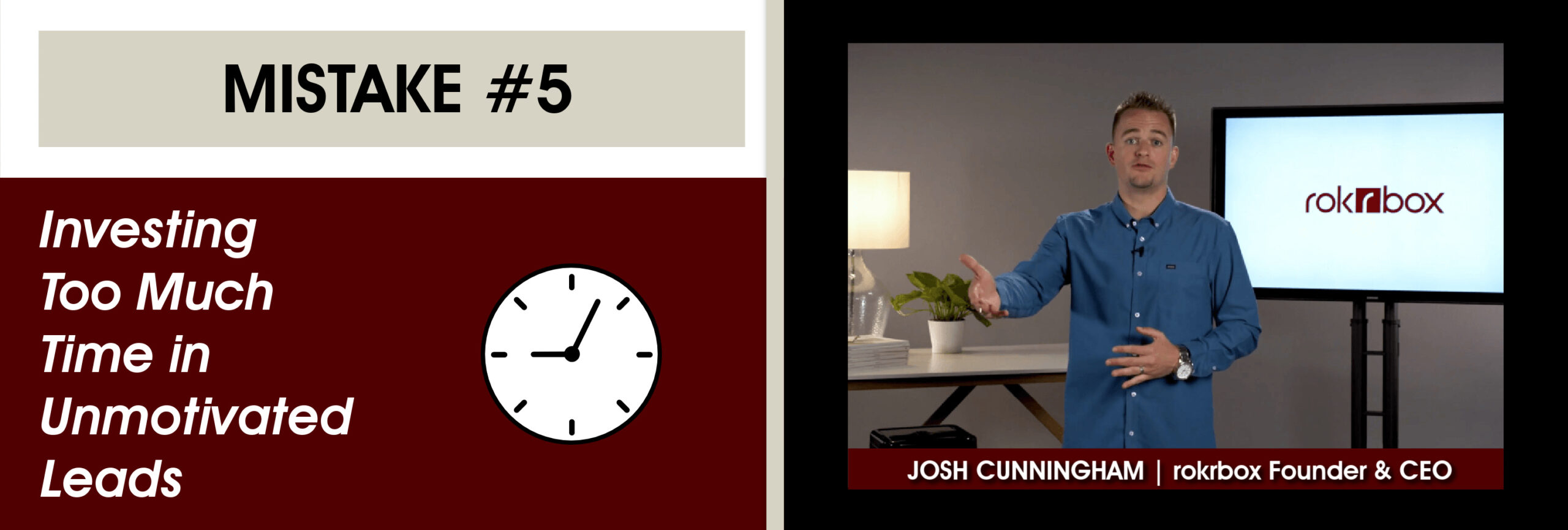
[24:30] Touching on the topic of confidence, Josh drives the point home, adding, “Your income is a direct reflection of the value that you add to other people’s lives. So if you’re afraid to ask for that, you’re not going to make much money. It’s as simple as that.”
Last, but not least, Josh shares Mistake #5: investing too much time in unmotivated leads. At rokrbox, Josh explains, they refer to this as “painting rocks”—or, to tie it into rokrbox’s namesake, attempting to validate fool’s gold.
[25:40] “You can’t create an opportunity where there is none,” Josh states, expanding on the risk of having a ‘scarcity mindset.’ “You need to move on from that lead. There’s a million different opportunities under the sky. We see that time and time again, where [agents] are just holding on to too much hope…and it’s wasting a bunch of time.”
[28:45] Brian thanks Josh for the excellent advice, then eagerly pivots to their next topic. “I just want to get your take on where this industry is going,” Brian tells Josh. “You’ve been it for 11 years now…I’d love to just learn what you see happening right now, in this industry.”
[29:00] Josh first addresses the growing emergence of new brokerages, such as eXp, which has given many real estate professionals benefits that the field previously lacked. This has allowed many agents to acquire “some sort of life plan” and be better prepared for retirement, when they stop selling real estate.
“That’s definitely caused quite a shake-up in the industry,” Josh says, then moves on to address the topic that is most likely to be on everyone’s mind. “Obviously, a year and a half ago, the world was brought new challenges, with the whole crisis of COVID.”
[30:00] Even after the pandemic hit, working virtually was nothing new to Josh—he’s spent the last four years running his company from Zoom after relocating to San Diego with his wife, Faith, and their little girl. “So about a year and a half ago, I felt like the rest of the world finally caught up to where I was,” Josh jokes, explaining that it resulted in a more easily navigable business environment.
Smiling, Josh adds, “This summer, I spent 4 months traveling across the country in an RV with my wife and one year-old daughter. Just a little bit of internet connection here and there, and I was still able to stay connected to the business.”

[30:45] He goes on to say that one of the most positive impacts of the pandemic was the opportunity to realistically consider what we truly need, particularly in our ability to solve people’s problems.
“I’m just very excited to see the quick evolution that’s happened over the last couple years,” Josh tells Brian, “and excited to see what’s going to happen in the future.”


